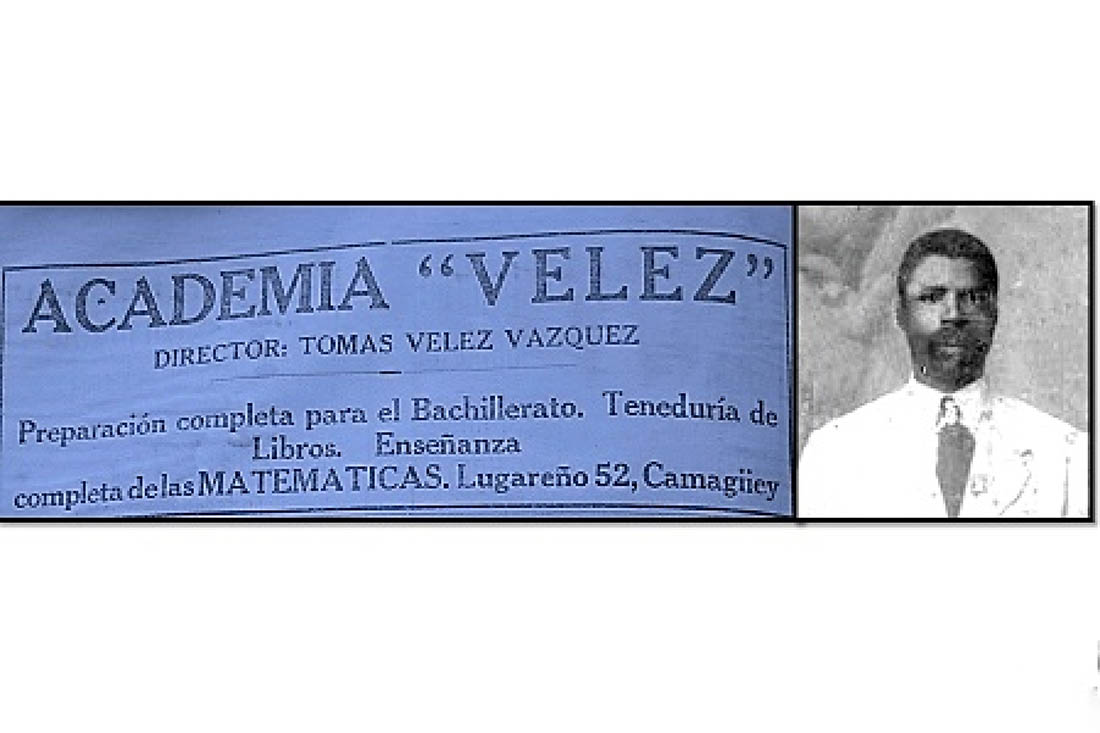Here I must say that I studied high school, along with my brother Francisco (a little over a year younger than me) at the night academy of Professor Tomás Vélez,… Despite his teaching — and his majesty — he was a man of prompt popular communication … Nicolás Guillén.
It is commendable to bring up the vision that the newspaper El Camagüeyano had, when on August 1st, 1944 Tomás Vélez Vázquez this great man physically ceased to exist:
Don Tomás Vélez Vázquez, prestigious and beloved mentor from Camagüey, passed away today in the capital. His body will be transferred to Camagüey by train, and will arrive tomorrow at twelve o’clock.
The death of the venerable comprovinciano, who for so many years exercised the teaching apostolate in Camagüey, has caused us the deepest sorrow and surely that in all sectors of this society, the sad news must be received with true feeling.
Don Tomás Vélez Vázquez, who in addition to his consecration to teaching, held high political positions, enjoyed general appreciation and his death is undoubtedly a duel for Camagüey.
The funeral was a social event where a large part of the city mobilized, at 11:45 a.m. They gathered at the Railway Station and moved to the mortuary house in Lugareño 207. Friends, relatives, students, colleagues, Camagüeyans from all sectors of society walked through the mortuary house, to testify to their children and other relatives the most sincere condolences. Honor guards were placed near the coffin as a sign of honor and respect until the 3rd at 9:00 a.m. when the burial took place in the General Cemetery of Camagüey. The white vault of the family, No. 271 located in the first Section of the SE Quadrant, received the mortal remains of this great man, where his daughter Dorila in the flower of youth and his beloved wife Aurelia, leaving them first, waited for him.
When I got home I would take a bath, have dinner and go to the night school directed by Tomás Vélez… and who did not charge us a penny for his teaching. Nicolás Guillén.
Mr. Tomás Vélez Vázquez, from the pen defends the need for an educated people according to the needs of the country, “…let’s take care that the Education centers respond to the laudable ends that we seek. “An apprenticeship in correspondence with the demands of the nation. Teach children responsible for the future. For the mentor “… educational transformations from an early age is the basis for initiating… a series of reforms, in harmony with the great demands of the environment in which we live.”
Indeed, he demands the redesign of educational plans in accordance with scientific development, at the same time, without lags and from childhood. It also points out about a comprehensive instruction without social barriers that summarizes what must be fought for collective improvement, but the fight must be intelligent, coordinated, with the participation of all possible factors so that all these causes, merging into the common feeling of love, make the firm base of new and useful situations of the human future. The actuality of his educational thoughts places Mr. Vélez as a man of determined ideas and actions.
“…From Tomás Vélez I have
by Tomás Vélez, (my teacher)
the blackboard with logarithms
and a dark hive of mathematical bees
in the Alley of Laughter. (Nicolas Guillen)
In the Callejón de la Risa, in the Barrio del Cristo, Maestro Vélez also had one of his academies, where generations of Camagüeyans from diverse social origins received mathematics classes that even the collective memory boasts of those evocations.
Tribute
Experience of Elvira Luaces Bonora (retired teacher): “After I grew up I found out that Mr. Tomás Vélez, that eminent teacher, did not charge Dad, because Dad says that he was not in a position to do so, but that Tomás asked him if I was interested and seeing my progress, I finished all my studies at your academy without paying anything.”
Thus, these social subjects within the structural system are therefore not simple spectators, but interfere with reality to modify it, recreating and creating, actively integrating themselves into the conditions of their context, responding to their challenges, objectifying themselves, discerning, transcending.
Bibliography
Henry Knight, Kezia Zabrina (2020) Asociaciones de negros y mestios en la ciudad de Camagüey (1879-1961). Sus aportes al desarrollo social. Editorial Ácana, Camagüey. Cub
Translated by: Aileen Álvarez García






